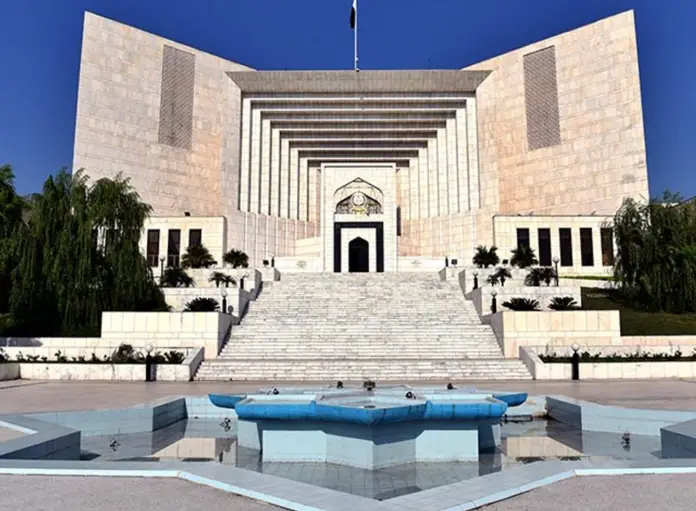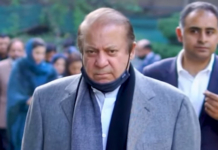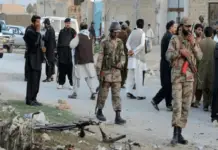The Supreme Court has rejected the plea for the formation of a full court bench to hear the case of Punjab chief minister’s election and the ruling of the deputy speaker.
According to the verdict, the three-member bench headed by Chief Justice Umar Bandial and comprising Justice Ijazul Ahsan and Justice Munib Akhtar will hear the petition filed against Punjab Assembly deputy speaker’s ruling.
The court also adjourned the hearing on the ruling till Tuesday 11:30am
Supreme Court Chief Justice Umar Bandial had earlier said that more legal clarification was required regarding the formation of a full court to issue a verdict in the case pertaining to Punjab Assembly deputy speaker’s ruling.
Earlier during the day, CJ Bandial stated that the head of the political party would have to listen to the opinion of the parliamentary party.
The chief justice made these remarks while hearing the petition against the ruling of the Punjab Assembly deputy speaker wherein he disregarded the 10 votes of Pakistan Muslim League-Quaid owing to them going against their political party head, Chaudhry Shujaat Hussain, in Friday’s election.
In his remarks during the hearing, CJ Bandial said the role of leader of the parliamentary party existed to reduce the role of party head, and there had been complaints in the past about the “dictatorship” of the party head.
Justice Ijaz-ul-Ahsan said that the facts of the dissident members case and this case were different. The position of the defecting members was that they did not get show cause or instructions.
Justice Ejaz-ul-Ahsan said that in this case, all 10 members cast their votes, and no member voted otherwise. He added that none of the ten members said that the parliamentary party did not meet on the matter.
He further said that the party head was the one who took action in the defection process.
Parvez Elahi’s lawyer Barrister Ali Zafar stated that the party head must give the declaration as per the decision of the parliamentary party. Zafar said that the constitution was very clear in terms of Article 63-A.
Regarding the formation of the full court, he said that formation of full court was the discretion of the honorable court, but he also questioned whether all other judicial work should be stopped and the full court should hear one case.
CJ observed that by not making a full court bench, the court could focus on other pending cases.
Justice Muneeb Akhtar said that before the 18th amendment, Article 63A dealt with the instructions of the party chief but after the amendment, the party leader was replaced by the parliamentary party.
Justice Ijazul Ahsan stated that only those members who were present in the assembly were part of the parliamentary party, and that there was a difference between a political party and a parliamentary party.
Earlier, at the start of the hearing, deputy speaker’s lawyer Irfan Qadir requested the court to form a full court bench.
During the hearing in the Supreme Court, when deputy speaker Irfan Qadir’s lawyer requested the court to form a full bench, he was questioned the points the full court should hear.
In his reply, Qadir replied that the [court] should read paragraph one or two of the judgement.
Chief Justice Umar Ata Bandial remarked that their decision was clear. He said that in the presidential reference, there had been complaints about the “dictatorship” of the party head . He added that the party head would also have to listen to the opinion of the parliamentary party.
During the hearing, Mansoor Awan was asked by Justice Ijazul Ahsan which part of the Supreme Court’s verdict had the deputy speaker relied on.
Addressing the lawyer, Justice Ahsan said that the role of the party head and parliamentary party was separate and that there was a difference between the party directive and declaration.
Irfan Qadir said that the president sent a reference to the interpretation for the interpretation of Article 63A and that it could not be read in isolation. He said that political parties had an important role in parliamentary democracy and their weakening would endanger the democratic system.
Justice Ijazul Ahsan said that those members who were present in the assembly were part of the parliamentary party, and there was a difference between a political party and a parliamentary party.
Moreover, former president of Supreme Court Bar Association, Latif Afridi, said to the court that a full court should be constituted on the issue to avoid a constitutional crisis.
The bench adjourned the hearing and reserved the decision on the formation of the full court bench.







